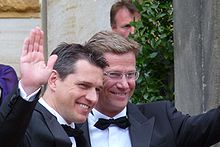Guido Westerwelle
[3] He graduated from Ernst Moritz Arndt Gymnasium in 1980 after academic struggles resulted in his departure from previous institutions where he was considered an average student at best, but substandard otherwise.
In a 1988 newspaper interview, he singled out the FDP's rejection of an amnesty for tax offenders and its diminished enthusiasm for nuclear power as fruits of the youth wing's labors.
As his parliamentary group's home affairs spokesman, he was instrumental in swinging the FDP behind a 1999 government bill to make German citizenship available to children born in Germany of non-German parents.
[8] Since the FDP had never claimed such a candidacy (and hasn't done since) and had no chance of attaining it against the two major parties, this move was widely seen as political marketing alongside other ploys, such as driving around in a campaign van dubbed the Guidomobile, wearing the figure 18 on the soles of his shoes or appearing in the Big Brother TV show.
[2][11] Over the following years, in an effort to broaden the party's appeal, Westerwelle embraced its left wing under former justice minister Sabine Leutheusser-Schnarrenberger and focused his campaign messages on tax cuts, education and civil rights.
[28] Amid efforts by the United States and European nations to isolate Iran's then-president, Mahmoud Ahmadinejad, Westerwelle traveled to Tehran in February 2011 to bring home two journalists for the weekly newspaper Bild am Sonntag who were released after being arrested in October 2010.
[29] A condition of their release was that Westerwelle meet with Ahmadinejad, causing Iranian exile groups in Europe to condemn the visit and to argue that Germany was bowing to the Tehran government at a time when security forces were cracking down on pro-democracy demonstrators.
[37] On 4 December 2013, Westerwelle walked with opposition leaders through an encampment on Kiev's Maidan Nezalezhnosti, the focus of protests over the Yanukovych government's U-turn away from the European Union and toward Russia; Russian Prime Minister Dmitry Medvedev subsequently called any participation by foreign officials in the political events unfolding in Ukraine "interference in internal affairs.
Earlier, he had initially been cautious before making any pronouncements about Tunisia and Egypt, but in the case of Libya, he quickly called out Gaddafi as a dictator, and argued in favor of EU-level sanctions against the regime in Tripoli.
[39][40] Strongly motivated by a widespread aversion in Germany to the use of military force, he shared with Chancellor Merkel a deep scepticism about a no-fly zone as it was suggested by France and the United Kingdom.
[42] During a visit to Benghazi in June 2011, Westerwelle announced that Germany would recognize the rebel National Transitional Council as the legitimate representative of Libyans.
[45] When the Konrad Adenauer Foundation was ordered to close in Abu Dhabi later that year, Westerwelle personally pressed his UAE counterpart Abdullah bin Zayed Al Nahyan to rethink the decision.
[46] In June 2011, Westerwelle became the first German foreign minister to travel to Darfur, where he visited the United Nations/African Union operation UNAMID toward which Germany had contributed military, police and civilian personnel.
[14] After the U.S. midterm elections in 2010, Westerwelle called on newly empowered Republicans in the U.S. Congress to stand by President Barack Obama’s goals of non- proliferation and the eventual elimination of nuclear weapons.
[56] Shortly after, Westerwelle publicly condemned the judgments against President Alexander Lukashenko's main political opponent Andrei Sannikov and other opposition supporters.
[57] As a consequence, Poland, France and Germany pressed their EU partners in to impose tougher sanctions against the Belarusian leadership following the crackdown and trials of opposition leaders in the country who held peaceful protests against the fraudulent presidential elections.
[64] Following the controversial 2012 Munich artworks discovery, he called for greater transparency in dealing with the find, which he warned could have lasting damage to Germany's international friendships.
In 2012, he and finance minister Wolfgang Schäuble were at loggerheads after a high-court ruling demanded the government provide equal tax treatment to gay civil servants and armed forces members.
[69] In 2013, he announced plans to launch an initiative at the United Nations General Assembly to agree an optional protocol to the International Covenant on Civil and Political Rights that would give greater data protection to internet users.
Despite losing, Westerwelle said he would stick to his original assessment that Schröder's appointment as chairman of the North European Gas Pipeline Company was "problematic".
[72] On 27 September 2009, at a press conference after the election, Westerwelle refused to answer a question in English from a BBC reporter, stating that "it is normal to speak German in Germany".
[76] Westerwelle made public statements in 2010 about the "welfare state",[77] saying that promising the people effortless prosperity may lead to "late Roman decadence", in reference to a verdict in the Federal Constitutional Court of Germany regarding Hartz IV.
[78][79] Other official trips as foreign minister included Mronz, an event manager, and Ralf Marohn, a partner in his brother's company,[80] also causing controversy.
Westerwelle retorted that it was normal for foreign ministers to take industry representatives on their trips, calling himself a victim of "a left-wing zeitgeist that considers making business questionable".
[81] According to Politico Europe Westerwelle contributed to the decline of the power of the German foreign ministry due to his lack of expertise in the area and was considered ineffective in the role.



